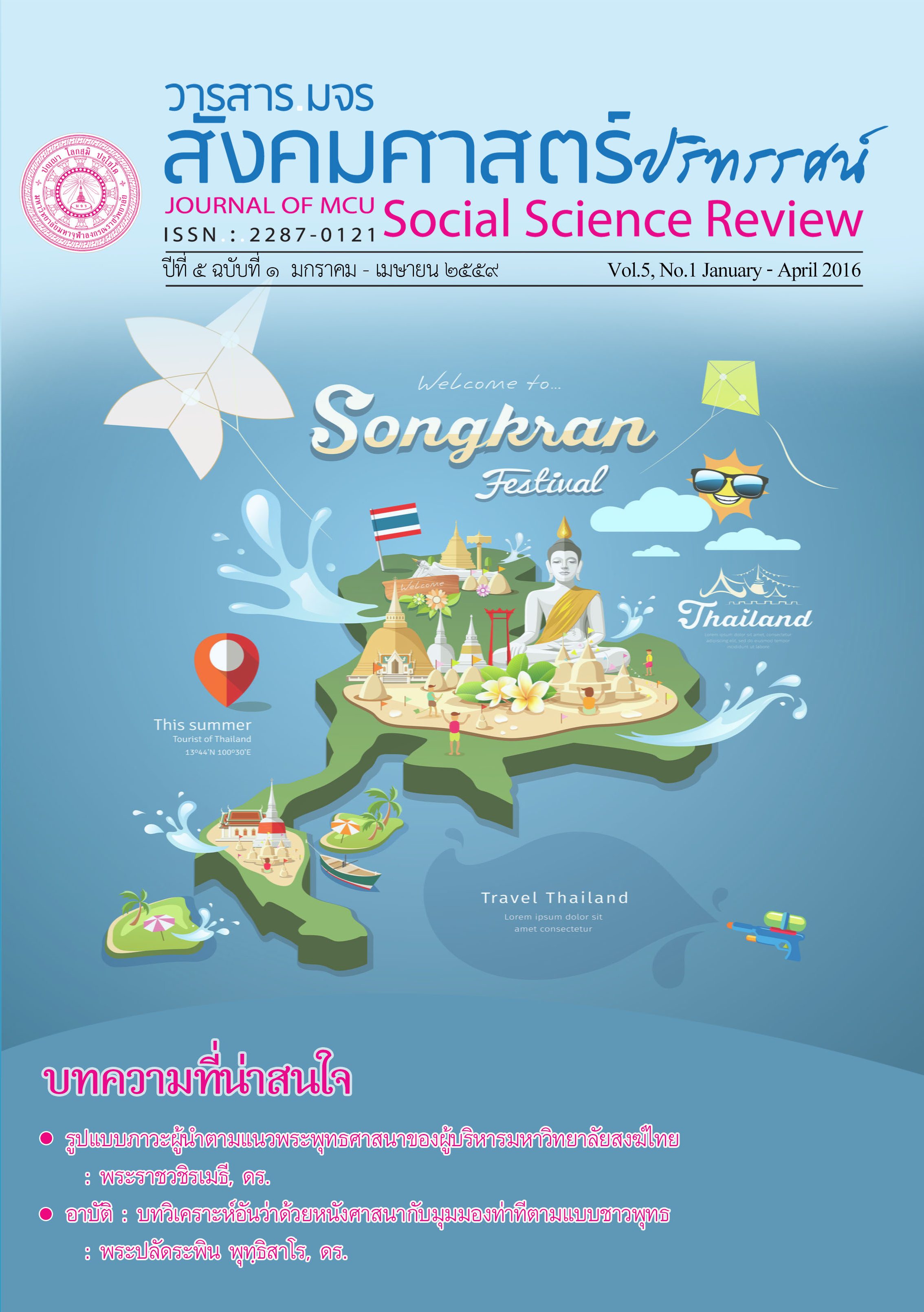การวิเคราะห์องค์ประกอบภาวะผู้นําด้านคุณธรรมจริยธรรมของผู้บริหารสถานศึกษาในสังกัดสํานักงานเขตพื้นที่การศึกษาประถมศึกษาชัยภูมิ เขต ๑
คำสำคัญ:
องค์ประกอบ, ภาวะผู้นำ, คุณธรรมจริยธรรมบทคัดย่อ
บทความวิจัยนี้ มีวัตถุประสงค์การวิจัย ดังนี้ (๑) เพื่อศึกษาภาวะผู้นำด้านคุณธรรมจริยธรมของผู้บริหารสถานศึกษาในสังกัดสำนักงานขตพื้นที่การศึกษาประถมศึกษาชัยภูมิ เขต ๑() เพื่อวิเคราะห์องค์ประกอบภาวะผู้นำด้นคุณธรรมจริยธรรมสำหรับผู้บริหารสถานศึกษาสังกัดสำนักงานเขตพื้นที่การศึกษาประถมศึกษาชัยภูมิขต ๑ และ (๓) เพื่อวิเคราะห์องค์ประกอบเชิงยืนยันของภาวะผู้นำด้านคุณรรมจริยธรรมของผู้บริหารสถานศึกษาในสังกัดสำนักงานเขตพื้นที่การศึกษาประถศึกษาชัยภูมิ ขต ๑ กลุ่มตัวอย่งที่ใช้ในการวิจัยครั้งนี้ ประกอบด้วย กลุ่มตัวอย่างที่ใช้ในการสัมภาษณ์ ได้แก่ ผู้บริหารสถานศึกษาจำนวน ๑๐ คน ครูผู้สอนจำนวน ๑๐ คน กลุ่มตัวอย่างในการตอบแบบสอบถาม ผู้วิจัยได้กำหนดสัดส่วนของกลุ่มตัวอย่าง จำนวน ๕๐๐ คน แบ่งออกเป็นผู้บริหารสถานศึกษา จำนวน ๕๖ คน และครูผู้สอนจำนวน ๔๔๔ คน ด้วยวิธีการเลือกตัวอย่างแบบโควตา (Quot Sampling) เครื่องมือที่ใช้ในการเก็บรวบรวมข้อมูล ประกอบด้วยแบบสัมภาษณ์กึ่งมีโครงสร้าง (Semi-Structured Interview) และแบบสอบถามเกี่ยวกับองค์ประกอบภาวะผู้นำด้นคุณธรรมจริยธรรมด้านคุณธรรมจริยธรรมของผู้บริหารสถานศึกษาในสังกัดสำนักงานเขตพื้นที่การศึกษาประถมศึกษาชัยภูมิ ขต ๑ ซึ่งเป็นแบบสอบถามชนิดมาตราส่วนประเมินค่ (Rating Scale) ชนิด ๕ ระดับ วิเคราะห์ข้อมูลโดยใช้โปรแกรมสำเร็จรูปทางสถิติสถิติที่ใช้ในการวิเคราะห์ข้อมูล ได้แก่ ค่ร้อยละ ค่าเฉลี่ย ค่เบี่ยงเบนมาตรฐาน การวิเคราะห์องค์ประกอบ (Exploratory Factor analysi) การวิเคราะห์ถดถอยพหุคูณแบบขั้นตอน(Stepwise Multiple Regression Analysi) และการวิเคราะห์องค์ประกอบเชิงยืนยัน(Confirmatory Factors Analysis)ผลการศึกษาพบว่า๑. การศึกษาภาวะผู้นำด้นคุณธรรมจริยธรรมสำหรับผู้บริหารสถานศึกษาสังกัดสำนักงานขตพื้นที่การศึกษาประมศึกษาชัยภูมิเขต ๑ ๑) ผู้บริหารควรจะมีหลักภาวะผู้นำในการบริหารด้านคุณรรมจริยธรม ควรจะใช้หลัก พรหมวิหาร ๔ หลักสัปปุริสธรรม ๗ สำหรับครูผู้สอนอยากจะให้ผู้บริหรนั้นใช้ หลักการครองตน ครองคน ครองงานและหลักธรรมาภิบาล ๒) หลักการบริหารที่ดีที่ทำให้ผู้ร่วมงานยอมรับ ได้แก่ หลักประชาธิปไตย หลักธรรม และหลักคุณธรรม ความชื่อตรง ซื่อสัตย์ ความสามารถในการถ่ายทอด ๓) ภาวะผู้นำการเปลี่ยนแปลง ผู้นำต้องมีหลักการบริหารที่ดีที่ผู้ร่วมงานยอมรับต้องประกอบไปด้วย ความเก่ง ความกล้า รู้จักบทบาทหน้าที่ของตนเองและผู้อื่น มีวิสัยทัศน์ ต้องกล้าคิดกล้าทำ มีประสบการณ์ตรง มีการปรับตัว๒. การวิเคราะห์ภาวะผู้นำด้นคุณธรรมจริยธรรมของผู้บริหารสถานศึกษาในสังกัดสำนักงานเขตพื้นที่กรศึกษาประถมศึกษาชัยภูมิ เขต ๑ ผู้บริหาร์ทุกคนที่ให้สัมภาษณ์มีความคิดเห็นสอดคล้องกันว่าผู้บริหาควรมีภาวะผู้นำการเปลี่ยนแปลงที่ผู้บริหารทุกคนจะนำองค์กรสู่ความสำเร็จต้องกล้าคิด กล้าทำมีวิสัยทัศน์ มีความคิดริเริ่มสร้างสรรค์ สำหรับครูผู้สอนมองว่าผู้บริหารคือหัวใจสำคัญของการดำเนิงานในองค์ก ครูผู้สอนมองว่า ผู้นำที่ดีต้องมีการบริหารที่ดีประกอบด้วย ๑) เชื่อมั่นไตนเอง หนักแน่น แสดงบทบาทผู้นำเสมอต้นเสมอปลาย ๒) รู้จักตนเองยอมรับข้อบกพร่องตนเอง และของผู้อื่น ๓) รู้สิ่งที่ถูกสิ่งที่ผิด รู้จักละอายสิ่งที่ทำผิด ๓) กระตือรือร้นกล้าติดสินใจเป็นนักประชาธิปไตย ๔ มีมนุษย์สัมพันธ์คัดเลือกคนเหมาะกับงาน ๕) มีความสามารถในการจูงใจคนอื่น และ ภาวะผู้นำที่ดีต้องเน้นการมีส่วนร่วม โดยผู้นำที่ดี ต้องเป็นผู้นำแบบประชาธิปไตยแสดงความคิดเห็นอย่างมีเหตุผล การแบ่งงานหน้าที่ของผู้ใต้บังคับบัญชา ดูแลผู้ใต้บังคับบัญชาที่ตั้งอาไว้ จกข้อมูลทั้งหมดสามารถกำหนดองค์ประกอบหลักได้ ๗ ด้านคือด้านหลักสัปปุริสธรรม ด้านหลักคุณธรรม ด้านหลักจริยธรรม ด้านการสื่อสารในองค์กร ด้านความร่วมมือในองค์ก ด้นวัฒนธรรมในองค์กร และด้านผู้นำในการเปลี่ยนแปลง๓. การวิเคราะห์องค์ประกอบเชิงยืนยันภาวะผู้น้ำค้นคุณธรรมจริยธรรมของผู้บริหารสถานศึกษาในสังกัดสำนักงานเขตพื้นที่การศึกษาประถมศึกษาชัยภูมิ เขต ๑ องค์ประกอบทั้ง ๗ด้าน ได้แก่ ด้านหลักสัปปุริสธรรม ด้านหลักคุณธรรม ด้านหลักจริยธรรม ด้านการสื่อสารในองค์กรด้านความร่วมมือในองค์กร ด้านวัฒนธรรมในองค์กร และด้านผู้นำในการเปลี่ยนแปลง ซึ่งมีความกลมกลืนกับข้อมูลเชิประจักษ์อยู่ในกณฑ์ดีทุกด้าน ผลการวิเคราะห์จากการสัมภาษณ์ผู้บริหารและครูพบว่ามีความเห็นด้วยอยู่ในระดับมาก
เอกสารอ้างอิง
บุญมี แท่นแก้ว. จริยธรรมกับชีวิต. กรุงเทพมหานคร : โอเดียนสโตร์, ๒๕๕๒.
สมคิด บางโม. จริยธรรมธุรกิจ. กรุงเทพมหานคร : พัฒนวิทย์การพิมพ์, ๒๕๔๙.
อาจอง ชุมสาย ณ อยุธยา คุณธรรมนำความรู้ : รูปแบบการเรียนการสอนแบบบูรณาการคุณค่าความเป็นมนุษย์. กรุงเทพมหานคร : วี.ที. ซี.คอมมิวนิเคชั่น, ๒๕๕O.
พระรรมปิฎก (ป.อ. ปยุตโต) พจนานุกรมพุทธศาสน์ ฉบับประมวลศัพท.กรุงเทพมหานคร :บริษัท เอส อาร์ พริ้นติ้ง แมส โปรดักส์ จำกัด. ๒๕๔๙.
(๒) วิทยานิพนธ์/รายงานวิจัย :
ชฎิล นิ่มนวล รูปแบบความสัมพันธ์ชิงโครงสร้างระหว่างคุณรรมของผู้บริหารสถานศึกษากับความภักดีต่อองค์การของผู้รับบริการ. ดุษฎีนิพนธ์ สาขาวิชาการบริหารการศึกษาบัณฑิตวิทยาลัย มหาวิทยาลัยศิลปากร, ๒๕๕๒.
ประทีป ฉัตรสุภางค์. ปัญหาจริยธรรมและจรรยาบรรณอาจารย์ในมหาวิทยาลัย และแนวทางแก้ไข.คณะสังคมศาสตและมนุษยศาสตร์ มหาวิทยาลัย มหิดล, ๒a๕๕.
พระครูอุทัยกิจพัฒน์ (วิรัตน์ สุกอินทร). การศึกษาภาวะผู้นำของพระสังฆาธิการจังหวัดอุทัยธานีตามหลักสัปปุริสธรรม ๗. บัณฑิตวิทยาลัย : มหาวิทยาลัยมหาจุฬาลงกรณราชวิทยาลัย, ๒๕๕๔.
พระดนัย อนาวิโล (บุญสาร). การประยุกต์ใช้หลักพุทธธรรมในสถานศึกษา: กรณีศึกษาผู้บริหารสถานศึกษาจังหวัดนครสวรรค์. บัณฑิตวิทยาลัย : มหาวิทยาลัยมหาจุฬาลงกรณ ราชวิทยาลัย, ๒๕๕๕.
(๓) สื่ออิเล็กทรอนิกส์/เว็บไซต์ :
สมบัติ ทีฆทรัพย์.คุณธรรม-จริยธรรมสำหรับนักบริหาร. [ออนไลน์]. แหล่งที่มา:http://pmcthailand.co.th/dwnld/article/oth/oth _merit.pdf. (๑๐ พฤศจิกายน ๒๕๕๗).
สุรยุทธ์ จุลานนท์ การเสริมสร้งคุณธรม จริยธรรม. และธรมาภิบาลในสังคมไทย. [ออนไลน์].แหล่งที่มา: http://www.eppo.go.th/admin /cab/sp-2550-02-10.html. (๑0พฤศจิกายน ๒๕๕๗).
(I) Books:
Barker. Transformational Nursing Leadership : A vision for the future. New York :National League for Nursing Press, 1992.
Bass. Leadership and Performance Beyond Expectations. New York :The FreePress, 1985.
Bennis and Nanus cite in Taher A Razik and Austin D. Swanson. FundamentalConcepts of Leadership. 2nd ed. New Jersey : Mirrill Prentrice HallInternational, 2001.
Bennis, Nanus. Leader. Strategies for Taking Change. New York : The Force Press,1985.
Burns. Leadership. New York : Harper and Row, 1978.
Dubrin, A.J. Leadership Research Finding, Practice, and Skills. Boston : HoughtonMifflin, 2004.
Dubrion & Ircland. Management and Organization. 2ed South Western PublishingCo. Ohio : 1993.
Hofstede, Greet H. Culture and Organizations: Software and Mind. New York :Mcgraw-Hill, 2005.
Tichy and M.A. DeVanna. The Transformational Leader. New York : John Wiley &Sons, 1990.
Weltch, M., & Tulbert, B. Practitioner's Perspective of Collaboration: A SocialValidation and Factor Analysis. Journal of Educational and
psychological consultant, 11(3-4), 357-378.Yukl. Leadership in Organizations. 4thed. Englewood Cliffs, NJ : Prentice Hall,1998.
ดาวน์โหลด
เผยแพร่แล้ว
รูปแบบการอ้างอิง
ฉบับ
ประเภทบทความ
สัญญาอนุญาต
ลิขสิทธิ์ (c) 2016 วารสาร มจร สังคมศาสตร์ปริทรรศน์

อนุญาตภายใต้เงื่อนไข Creative Commons Attribution-NonCommercial-NoDerivatives 4.0 International License.
เพื่อให้เป็นไปตามกฎหมายลิขสิทธิ์ ผู้นิพนธ์ทุกท่านต้องลงลายมือชื่อในแบบฟอร์มใบมอบลิขสิทธิ์บทความให้แก่วารสารฯ พร้อมกับบทความต้นฉบับที่ได้แก้ไขครั้งสุดท้าย นอกจากนี้ ผู้นิพนธ์ทุกท่านต้องยืนยันว่าบทความต้นฉบับที่ส่งมาตีพิมพ์นั้น ได้ส่งมาตีพิมพ์เฉพาะในวารสาร มจร สังคมศาสตร์ปริทรรศน์ เพียงแห่งเดียวเท่านั้น หากมีการใช้ภาพหรือตารางหรือเนื้อหาอื่นๆ ของผู้นิพนธ์อื่นที่ปรากฏในสิ่งตีพิมพ์อื่นมาแล้ว ผู้นิพนธ์ต้องขออนุญาตเจ้าของลิขสิทธิ์ก่อน พร้อมทั้งแสดงหนังสือที่ได้รับการยินยอมต่อบรรณาธิการ ก่อนที่บทความจะได้รับการตีพิมพ์ หากไม่เป็นไปตามข้อกำหนดเบื้องต้น ทางวารสารจะถอดบทความของท่านออกโดยไม่มีข้อยกเว้นใดๆ ทั้งสิ้น





